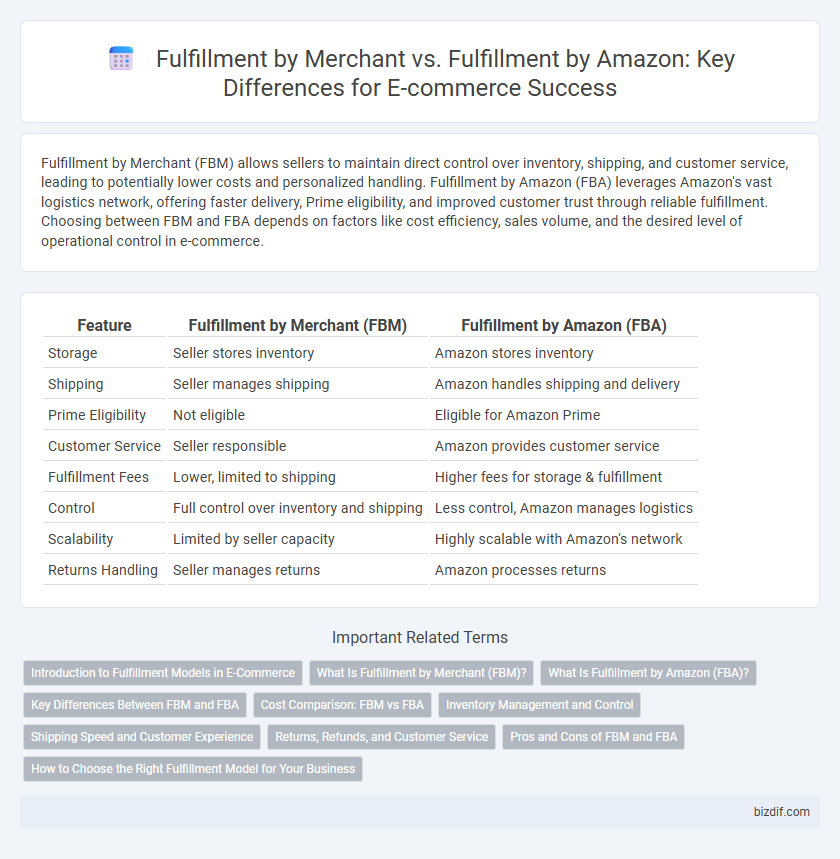Fulfillment by Merchant (FBM) allows sellers to maintain direct control over inventory, shipping, and customer service, leading to potentially lower costs and personalized handling. Fulfillment by Amazon (FBA) leverages Amazon's vast logistics network, offering faster delivery, Prime eligibility, and improved customer trust through reliable fulfillment. Choosing between FBM and FBA depends on factors like cost efficiency, sales volume, and the desired level of operational control in e-commerce.
Table of Comparison
| Feature | Fulfillment by Merchant (FBM) | Fulfillment by Amazon (FBA) |
|---|---|---|
| Storage | Seller stores inventory | Amazon stores inventory |
| Shipping | Seller manages shipping | Amazon handles shipping and delivery |
| Prime Eligibility | Not eligible | Eligible for Amazon Prime |
| Customer Service | Seller responsible | Amazon provides customer service |
| Fulfillment Fees | Lower, limited to shipping | Higher fees for storage & fulfillment |
| Control | Full control over inventory and shipping | Less control, Amazon manages logistics |
| Scalability | Limited by seller capacity | Highly scalable with Amazon's network |
| Returns Handling | Seller manages returns | Amazon processes returns |
Introduction to Fulfillment Models in E-Commerce
Fulfillment by Merchant (FBM) allows sellers to handle storage, packaging, and shipping independently, providing greater control over inventory and customer service but requiring significant time and resources. Fulfillment by Amazon (FBA) leverages Amazon's extensive logistics network, automating storage, packing, and delivery while offering faster shipping options and eligibility for Amazon Prime. Choosing between FBM and FBA impacts operational efficiency, shipping costs, and customer experience in e-commerce businesses.
What Is Fulfillment by Merchant (FBM)?
Fulfillment by Merchant (FBM) involves sellers managing inventory storage, packaging, and shipping directly to customers without using Amazon's logistics network. This method offers greater control over inventory, shipping costs, and customer service but requires more operational effort from the merchant. FBM is ideal for sellers with specialized products, unique packaging needs, or established shipping infrastructure outside Amazon's fulfillment centers.
What Is Fulfillment by Amazon (FBA)?
Fulfillment by Amazon (FBA) is a service where Amazon handles storage, packing, and shipping of sellers' products from its extensive fulfillment centers, ensuring fast and reliable delivery. FBA also manages customer service and returns, enhancing the buyer experience and improving seller ratings on the Amazon marketplace. This model allows sellers to leverage Amazon's logistics network and Prime eligibility, driving higher sales and streamlined operations.
Key Differences Between FBM and FBA
Fulfillment by Merchant (FBM) requires sellers to handle storage, packaging, and shipping of products themselves, offering greater control over inventory and shipping processes. Fulfillment by Amazon (FBA) leverages Amazon's warehousing and logistics network, enabling faster delivery through Prime eligibility and enhanced customer trust. FBM typically incurs lower fees but demands more operational effort, whereas FBA involves higher costs offset by streamlined fulfillment and superior scalability.
Cost Comparison: FBM vs FBA
Fulfillment by Merchant (FBM) typically incurs lower upfront costs as sellers handle storage, packing, and shipping, but may face higher variable expenses like shipping fees and labor. Fulfillment by Amazon (FBA) involves fixed fees for storage and fulfillment services, often leading to higher costs for long-term storage and slow-moving inventory. Comparing cost efficiency depends on factors like sales volume, product size, and turnover rate, with FBA offering scalability and Prime eligibility benefits at a premium price.
Inventory Management and Control
Fulfillment by Merchant (FBM) offers sellers complete inventory control by allowing them to store and manage stock independently, reducing reliance on third-party warehouses. Fulfillment by Amazon (FBA) streamlines inventory management through Amazon's extensive fulfillment network, providing faster shipping but limiting sellers' direct oversight of stock levels. Choosing between FBM and FBA depends on balancing the need for hands-on inventory control with the benefits of Amazon's scalable logistics infrastructure.
Shipping Speed and Customer Experience
Fulfillment by Amazon (FBA) offers faster shipping speeds with Amazon's extensive logistics network, ensuring same-day or two-day delivery that enhances customer satisfaction and loyalty. Fulfillment by Merchant (FBM) may result in longer shipping times depending on the seller's capabilities, potentially impacting customer experience and repeat purchases. Optimizing shipping speed through FBA generally improves delivery reliability and overall customer trust in e-commerce transactions.
Returns, Refunds, and Customer Service
Fulfillment by Merchant (FBM) places responsibility for returns, refunds, and customer service on the seller, requiring robust systems to manage these aspects efficiently to maintain customer satisfaction. Fulfillment by Amazon (FBA) offers streamlined handling of returns and refunds through Amazon's established processes, enhancing trust and convenience for buyers while reducing seller workload. Sellers using FBA benefit from Amazon's customer service expertise, which can lead to higher positive feedback and improved seller ratings in the e-commerce marketplace.
Pros and Cons of FBM and FBA
Fulfillment by Merchant (FBM) allows sellers to maintain control over inventory and shipping, reducing fees and enabling personalized packaging, but it demands more time, resources, and potentially slower delivery times. Fulfillment by Amazon (FBA) offers fast Prime shipping and Amazon's customer service support, increasing sales potential and storage convenience, yet it involves higher fees and reduced control over product handling. Choosing between FBM and FBA depends on seller priorities like cost management, scalability, and customer experience optimization.
How to Choose the Right Fulfillment Model for Your Business
Choosing between Fulfillment by Merchant (FBM) and Fulfillment by Amazon (FBA) depends on factors like inventory control, shipping speed, and cost management. FBM offers greater control over inventory and personalized customer service but requires more effort in logistics, whereas FBA provides Amazon's extensive distribution network and Prime eligibility, enhancing delivery speed and customer trust. Assess your business size, sales volume, profit margins, and capacity to handle shipping to determine the most efficient fulfillment model.
Fulfillment by Merchant vs Fulfillment by Amazon Infographic

 bizdif.com
bizdif.com